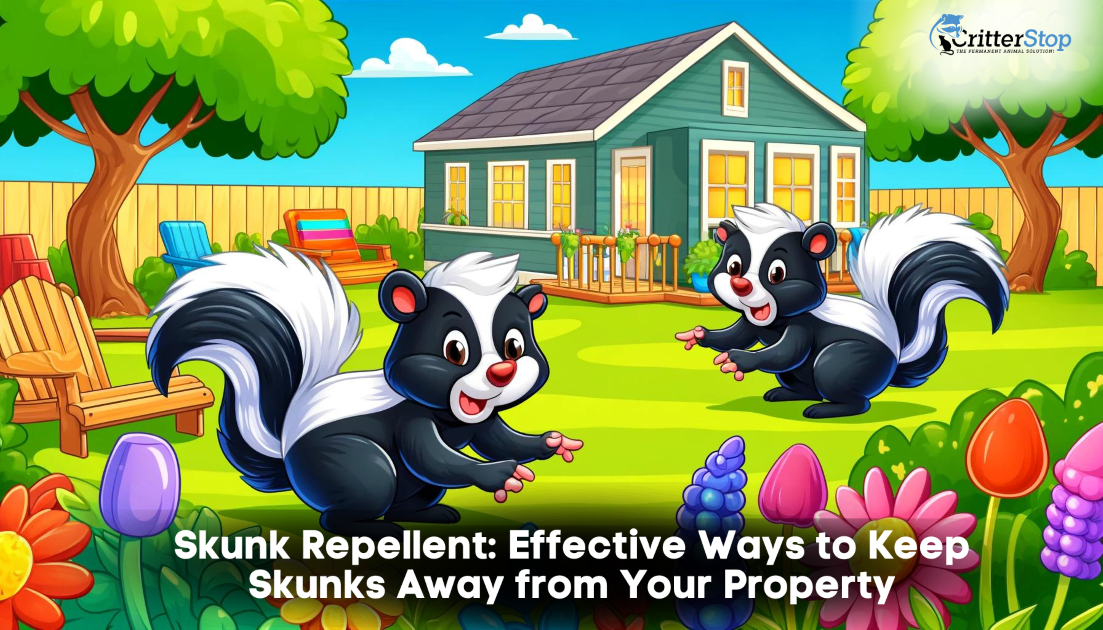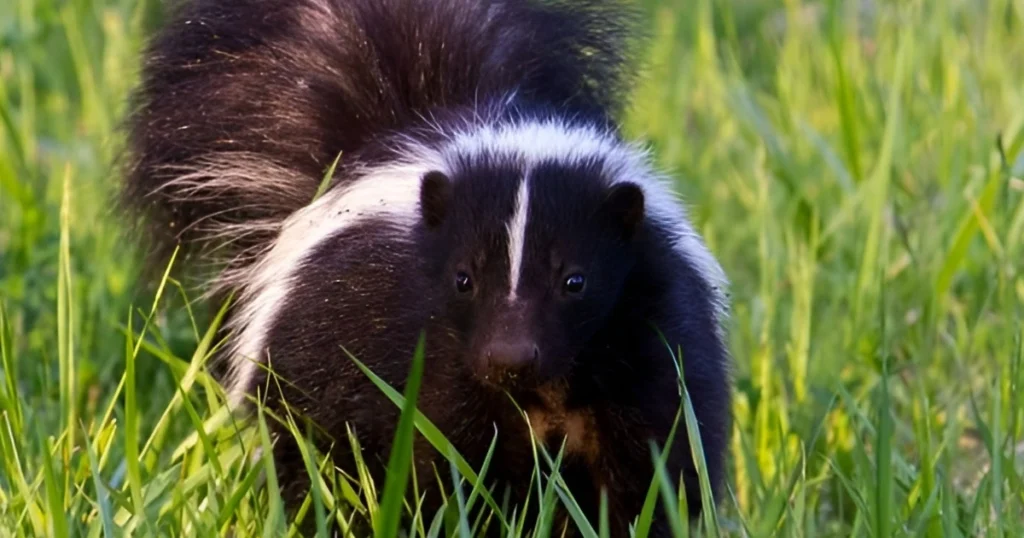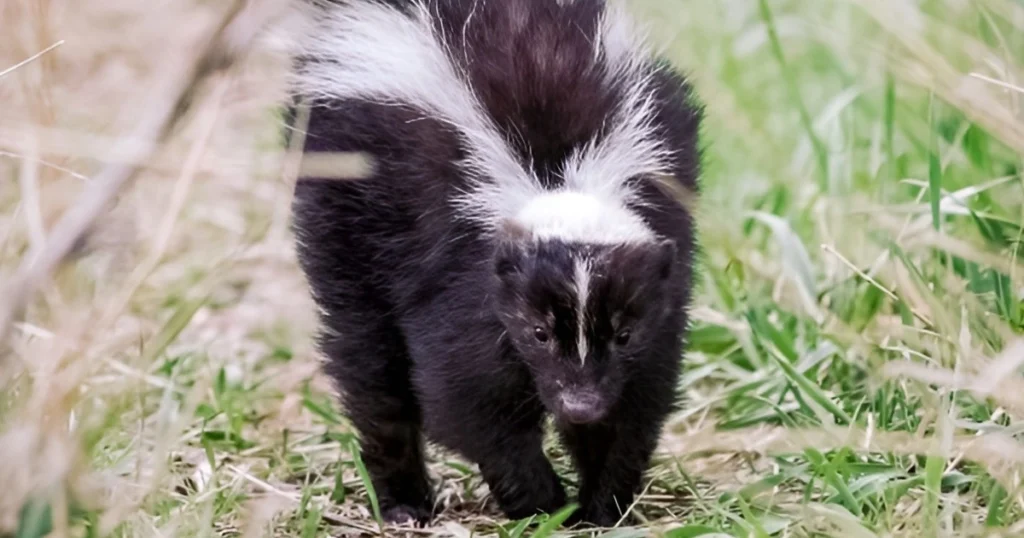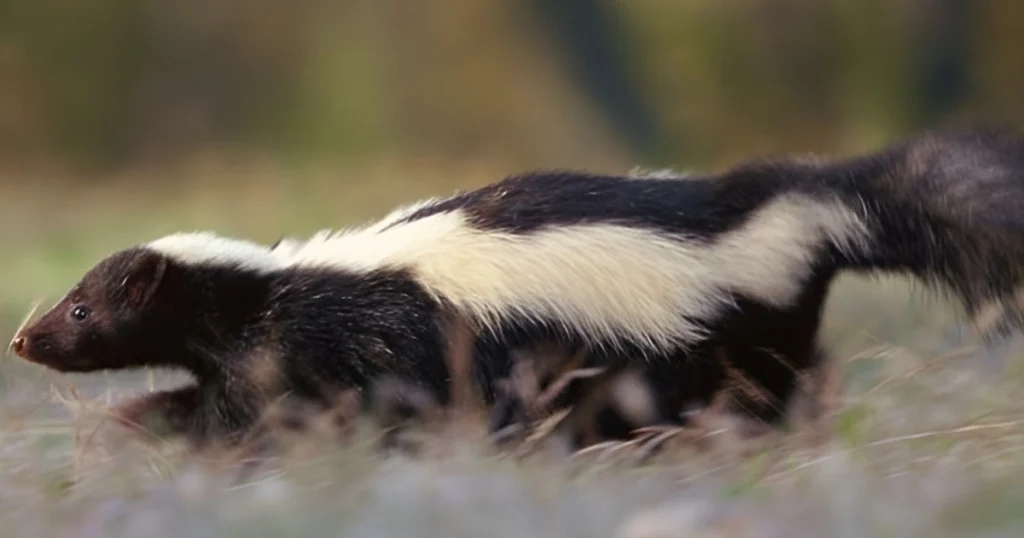
Skunks are notorious for their pungent odor and their ability to spray it as a defense mechanism. While skunks may be cute and harmless in the eyes of some people, others may find them a nuisance and a potential threat to their property. Skunks can cause damage to gardens, lawns, and homes, and their spray can be difficult to remove from clothing and other surfaces.
One solution to keeping skunks away is the use of skunk repellent, which comes in various forms, including sprays, granules, and electronic devices. These repellents emit a scent or sound that is unpleasant to skunks, causing them to avoid the area. While some repellents may be more effective than others, you must keep in mind that no repellent is completely guaranteed to work. When using any type of repellent, it is also important to follow the instructions carefully to ensure safety and effectiveness.
If chemicals and electronic devices are things you want to avoid, there are also natural remedies that may help repel skunks. These include planting certain types of plants, such as marigolds and alliums, which have a strong odor that skunks dislike. Additionally, keeping the area clean and free of food sources, such as pet food or garbage, can also help deter skunks. Overall, using a combination of methods may be a good way to keep skunks away and prevent property damage.

Skunks’ characteristics are their black and white fur and the potent odor they emit when threatened or scared. However, there is more to skunks than just their smell. Understanding their behavior, habitats, and habits can help in preventing unwanted encounters and the need for skunk repellent.
Skunks are nocturnal animals, meaning they are active during the night and sleep during the day. Because they are omnivores, they eat both plants and animals. Their defensive behavior when threatened is one of their trademarks. They will raise their tail and release a strong-smelling spray as a warning to potential predators.
Some of the different habitats where skunks can be found are forests, grasslands, and suburban areas. Usually, their homes are located in burrows or dens, which can be found in hollow logs, under porches, or in other small spaces.
Skunks are also known for their digging habits, as they will dig for food and create dens. This can lead to damage to lawns and gardens. Garbage and pet food left outside can also attract skunks, making these areas potential targets for skunk encounters.
Overall, understanding skunk behavior, habitats, and habits can help in preventing unwanted encounters and the need for skunk repellent. By taking preventative measures such as securing garbage and pet food, and sealing off potential den sites, individuals can coexist with skunks safely and respectfully.
There are various types of skunk repellents available, each with its own set of pros and cons. This section will discuss the main two types of skunk repellents: Chemical Repellents and Natural Repellents.
Chemical repellents are formulated with specific chemicals that emit a strong odor, which skunks find unpleasant. These repellents are available in the form of sprays, granules, and concentrates. The active ingredients in these repellents include ammonia, naphthalene, and sulfur.
One of the most popular chemical skunk repellents comes in the form of spray. It is simple to use and can be sprayed directly on the areas where skunks are likely to be found. Still, you should keep in mind that chemical repellents can be harmful to the environment and other animals. They can also be toxic to humans if ingested or inhaled.
Natural skunk repellents are made from natural ingredients and are considered to be safer for the environment and other animals. Some good natural skunk repellents include vinegar, citrus fruits, and hot peppers.
A vinegar solution spray bottle is a popular choice among homeowners. It is easy to make and can be sprayed directly on the areas where skunks are likely to be found. Skunks find the strong odor of acetic acid, which vinegar contains, unpleasant. Despite this, natural repellents are known to be less effective than chemical repellents.
In conclusion, choosing the best skunk repellents depends on your personal preferences and the severity of your skunk problem. It is important to use caution when handling any type of repellent and follow the manufacturer's instructions carefully. Furthermore, repellents should only be applied as a preventive measure and are not an effective way to deal with skunks that have already entered a residence.
Skunks are known for their pungent odor and can cause a lot of trouble if they decide to make their home in your yard, in which case it’s best to contact a wildlife professional. Fortunately, there are many commercial skunk repellents available in the market that may help you keep these pesky creatures away from your property. In this section, we will discuss two types of commercial skunk repellents: sprays and liquids, and granular and solid forms.
Sprays and liquids are a popular choice for those looking to keep skunks away from their property. By spraying certain surfaces, such as garbage cans, grass, and plants, they will acquire a strong smell that is unpleasant to skunks, but not harmful to them.
Granular and solid forms of skunk repellents are another option for those looking to keep skunks away from their property. By sprinkling granules in certain areas, such as flowerbeds, sheds, and gardens, they will gain a strong smell that is unpleasant to skunks, but not harmful to them.
Overall, there are many types of commercial skunk repellents available in the market that can help you keep skunks away from your property. Making sure that you use a product that is safe for pets and children, and that contains natural ingredients that are unpleasant to skunks, is important. However, it’s important to note that these products should only be used as preventive measures and are not the best way to remove skunks from your property.

Skunks are notorious for their strong odor, and no one wants them to invade their property. Some DIY methods may be able to help keep them at bay but are not an effective method to get rid of a skunk that has already found its way into your home. In that case, your best option is to hire a wildlife professional.
One good and natural option is vinegar. Skunks hate the smell of vinegar, so spraying it around your property can help keep them away. To repel skunks, mix equal parts of white vinegar and water in a spray bottle.
It's important to note that vinegar can be harmful to plants, so avoid spraying it directly on them. Instead, spray it around the perimeter of your property, focusing on areas where skunks are likely to enter, such as around garbage cans and near the foundation of your house.
Another way to repel skunks with vinegar is to soak rags or cotton balls in the vinegar solution and place them in areas where skunks are likely to enter. This will help keep them away without harming your plants.
In addition to vinegar, there are other natural skunk repellents that you can try, such as citrus peels, cayenne pepper, and ammonia. However, it's important to note that these solutions may not be as effective as vinegar and may also be harmful to plants if not used properly.
Overall, using a natural skunk repellent like vinegar can be a possible and safe way to keep skunks away from your property. By following these DIY solutions, you avoid having to resort to harmful chemicals or traps.
No one wants skunks to invade their property and there are several animal repellents available on the market that can help you keep them away. However, it's important to know how to properly apply these repellents to ensure their safety and not use them to deal with an established skunk invasion. If a skunk has already entered your home, most homeowners find that hiring a wildlife professional is the most effective solution.
Before applying animal repellents, it's important to identify the areas where skunks are most active. This can include garbage cans, gardens, and any other areas where they may be attracted to food or shelter. Once you've identified these areas, follow these best practices for applying:
While skunk repellents can be effective, they can also be harmful if not used properly. Here are some safety considerations to keep in mind:
Skunk repellents can be a useful tool for keeping these pesky critters away from your property. By following these tips and safety considerations, you can keep yourself and your family safe.
When it comes to skunk repellents, there are many options available in the market. However, the effectiveness of repellents varies according to the product. This section will provide a comparative analysis of the most popular types of skunk repellents to help you choose the best one for your needs.
Chemical repellents are a popular choice among homeowners due to their effectiveness. Some well-known chemical repellents include ammonia, mothballs, and predator urine. Ammonia and mothballs are readily available and affordable, but their effectiveness is questionable. On the other hand, predator urine is highly effective but can be expensive.
A safer alternative to chemical repellents is the use of natural repellents. They are made from natural ingredients and are safe for certain pets and children over the age of five. Some common options of natural repellents are peppermint oil, garlic, and chili peppers. While natural repellents are a good choice, the need for them to be reapplied may be more frequent than that of chemical repellents.
Electronic repellents use ultrasonic sound waves to deter skunks, one example being the RibRave Ultrasonic Animal Repeller. They are safe and easy to use, but their effectiveness is questionable. Some homeowners have reported success with electronic repellents, while others have had ineffective results while using them.
In conclusion, the best skunk repellent depends on your personal preferences and needs. Chemical repellents are effective but may not be safe for pets and children. Natural repellents are generally safe but may need to be reapplied more frequently. Electronic repellents are safe and easy to use but may not be effective. Trying different types of repellents to find the one that works best for you is recommended.

While skunks’ nocturnal nature usually makes them stay away from humans, they can invade households and become a nuisance. To prevent skunks from entering your property, there are several preventive measures you can take. However, it’s important to note that the best and most effective solution for an ongoing skunk invasion is hiring a wildlife professional.
Skunks are attracted to areas with abundant food and shelter. A good way to discourage them from coming to your property is to remove any potential food sources. Securing your garbage cans, cleaning up any fallen fruits or vegetables, and keeping pet food indoors are good measures to take. Additionally, removing any potential shelter such as woodpiles or brush piles can discourage skunks from making their home on your property.
Installing physical barriers can be a good way of preventing skunks from entering your property. This includes fencing your yard and adding a barrier around your garden. The fencing height should least 3 feet and be buried at least 6 inches below ground to prevent skunks from digging underneath it. Additionally, using mesh or chicken wire around your garden can prevent skunks from accessing your plants.
Using skunk repellent can also be a good way to deter these animals. There are several types of skunk repellent available, including natural and chemical options. Predator urine, such as coyote urine, or hot pepper spray are some natural skunk repellents that can be good but may need to be reapplied frequently. Chemical repellents such as ammonia or mothballs can also be a good choice but should be used cautiously as they can be harmful to pets and humans.
If you implement preventive measures such as these, you may reduce the likelihood of skunks invading your property.
When it comes to using repellents, it is important to be aware of any regulations that may apply. In the United States, the Environmental Protection Agency (EPA) regulates the sale and use of all pesticides. These regulations are in place to guarantee the safety of humans, animals, and the environment. Before using any repellent, it is important to read the label carefully and follow all instructions.
While skunks can be a nuisance, it is important to remember that they also play an important part in the natural ecosystem. Using repellents that harm or kill skunks could also have unintended consequences for other wildlife in the area.
When choosing a repellent, it is important to select one that is humane and does not harm the skunk or any other wild animals. Moreover, considering the impact of the repellent on the environment is crucial as well.
Overall, it is important to use skunk repellents responsibly and in accordance with all relevant regulations and ethical considerations.

Encountering a skunk can be a smelly and unpleasant experience. Whether it's in your backyard or on a hike, it's important to know how to handle the situation. This section will provide you with some actions you can take and some tips for cleaning skunk spray. However, these are not successful methods for dealing with a trapped skunk in your home.
The first thing to do when encountering a skunk is to remain calm and still. Skunks have poor eyesight and will often spray when they feel threatened or scared. If you startle a skunk, it may spray you. Slowly and calmly back away from the skunk, giving it plenty of space to retreat.
If you or your pet have gotten sprayed by a skunk, the first step is to get away from the skunk and into the fresh air. Skunk spray can cause eye irritation, so be sure to flush your eyes with water if you've been sprayed in the face. Remove any clothing that has been sprayed and wash it separately from other clothes.
Skunk spray is notoriously difficult to remove, but there are some things you can do to minimize the smell. A good product is Skunk Off, which is specifically designed to neutralize it and can be found at most pet stores.
If you don't have Skunk Off, there are some household remedies you can try. For example, you can mix one quart of 3% hydrogen peroxide, 1/4 cup of baking soda, and one teaspoon of dish soap. Apply the mixture to the affected area and let it sit for 10-15 minutes before rinsing it off with water.
It's important to note that the spray can linger for several days, even after cleaning. Keep windows open and use fans to circulate air. Wash any bedding or clothing that has been sprayed, and consider using an air purifier to help remove the smell from the air.
Overall, the best way to deal with skunk encounters is to avoid them in the first place. Clear food sources that may attract skunks to your yard, like pet food bowls, and be aware of your surroundings when hiking or camping. If you do encounter a skunk, remain calm and take the appropriate actions to stay safe and minimize the smell. However, if your issue is that you have encountered a skunk on your property, your best bet is to get in contact with a wildlife professional.
Skunks can be a nuisance, especially when they invade your yard or home. Fortunately, there are various repellents available in the market that can prevent these invasions. Despite this, it should be noted that they aren’t effective against an ongoing invasion and a wildlife professional should be hired in those cases. Also, choosing the right product can be overwhelming, given the many available options. Here are some factors to consider when choosing.
In conclusion, when choosing the right repellent you need to carefully consider factors such as effectiveness, safety, ease of use, and longevity. Consideration of these factors and the reading of product reviews make you able to choose a repellent that suits your needs and can keep skunks away from your property. However, it’s important to keep in mind that repellents should only be used as a preventive measure and that hiring a wildlife professional is the best way to deal with an established skunk invasion.
In conclusion, there are a variety of repellents available on the market today. You can choose a natural skunk repellent such as citrus peels, ammonia, and vinegar, or more commercial products containing repellent chemicals such as capsaicin and naphthalene.
It is important to note that this is not a guaranteed solution, may not work in all situations, and is ineffective when a skunk has already entered your property. Additionally, some repellents may be harmful to pets or the environment, so it is important to carefully read and follow all instructions and warnings before using any product.
Ultimately, the best approach to preventing skunk encounters is to take proactive measures such as securing trash cans and removing potential food sources, as well as identifying and sealing off any potential entry points into homes or other structures.
By taking these steps and using repellent as a supplement, individuals can greatly reduce the likelihood of encountering skunks and minimize the potential for unpleasant interactions.
If you want to get a skunk out of your property safely, quickly, and permanently, Critter Stop can help you! We service residential & commercial customers in Texas, and offer a free inspection and estimate, as well as industry-leading guarantees. Contact us today at (214) 234-2616 and get rid of skunk invasions for good.
There are several types of products available in the market, and you can go for a chemical repellent, a natural skunk repellent, or electronic skunk repellents. However, there is no single best type that works for everyone. A repellent can be more or less effective depending on different factors, such as the severity of the skunk problem, the size of the area to be protected, and the type of skunks in the area. It is recommended to try different types of repellents and see which one works best for your particular situation and to get in touch with a wildlife professional if the skunk problem is particularly severe.
Food attracts skunks, as does shelter, so the best way to keep them away from your yard is to eliminate these attractants. Make sure to close your garbage cans well, remove any fallen fruits or vegetables from your garden, and keep pet food indoors. Also, seal any openings in your fence or deck that may provide shelter for skunks. If you have pets, it is essential to supervise them when they are outside, especially at night, as skunks have nocturnal habits.
The high-frequency sounds that ultrasonic devices emit are unpleasant to skunks and other animals. While some ultrasonic devices have reported success, there is no scientific evidence to support their effectiveness in repelling skunks. Additionally, ultrasonic devices may not work in all situations, as skunks may become habituated to the sound over time.
There are several non-toxic methods to prevent skunks from entering your property. You can install motion-activated lights or sprinklers, which can startle skunks and discourage them from entering. You can spray cayenne pepper, garlic, or vinegar around the perimeter of your property as natural repellents. Additionally, you can use physical barriers, such as fencing or netting, to keep skunks out.
Visit our Critter Library and learn more about our furry friends